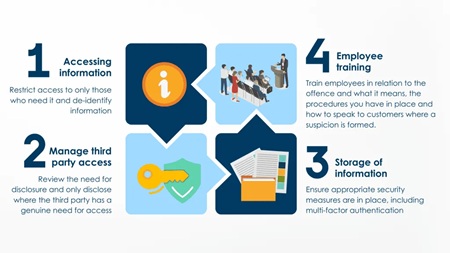AUSTRAC has released new guidance in relation to the tipping off offence, in light of the changes made to the AML/CTF Act.
From 31 March 2025, tipping off will be a criminal offence, with a maximum penalty of 2 years imprisonment, or 120 penalty units (or both). Tipping off involves disclosing certain types of information to another person, where it could reasonably be expected to prejudice an investigation of an offence against Commonwealth, state or territory law or proceeds of crime law. The types of information that reporting entities must not disclose includes:
- Information about suspicious matter reports (SMRs); and
- Information about notices compelling the reporting entity to produce documents to AUSTRAC.
Reporting entities and their employees must not disclose this type of information, regardless of whether they know or suspect an investigation has commenced. The key question is whether the disclosure of such information would have negative consequences for an investigation, whether currently in progress or in the future.
The tipping off offence applies to reporting entities, its officers, employees and agents and any person required to produce or give information to AUSTRAC under section 49 or 49B of the AML/CTF Act.
What will prejudice an investigation?
"Prejudice an investigation" simply means to negatively affect an investigation. The test is an objective test and does not require the person disclosing the information to know that disclosure of information will negatively affect an investigation. Whether the disclosure will have a negative affect on an investigation, will be determined by:
- What information is disclosed;
- Who the disclosure is made to;
- How the disclosure is made; and
- When the disclosure is made.
Reporting entities need to ensure their employees are aware of the tipping off offence and what it means to prejudice an investigation.
Managing customer risks
Tipping off risks can occur when ending a customer relationship or requesting further information from a customer. AUSTRAC guidance notes that where a reporting entity must do these things, that employees provide the customer with genuine information about the reason for engaging with the customer, without making any comment on suspicious activity of the customer. AUSTRAC has provided a useful list of examples of reasons to engage including:
- Complying with AML/CTF obligations;
- Ensuring you have the most up to date information on file;
- Resolving issues with customer identification documents;
- Collecting additional information as part of standard company procedures;
- Where ending a customer relationship – that the activities fall outside your risk appetite, or other reasons which indicate a commercial basis to end the relationship.
Disclosure to third parties
AUSTRAC's guidance notes that reporting entities can still disclose information to third parties who have been engaged to assist a reporting entity meet their AML/CTF obligations. Disclosure to consultants who assist a reporting entity to conduct AML/CTF risk assessments, or implement key AML/CTF processes, or to a legal adviser who advises a reporting entity of its AML/CTF obligations, are unlikely to be considered tipping off.
Key steps

Reporting entities need to take steps to reduce the risk of tipping off. This might include:
- Accessing information – restrict access to information to only those people who need to know it and de-identify information where widely distributed;
- Manage third party access – review the need for disclosure and only disclose where the third party has a genuine need for access. If you are sharing information overseas, consider the legal obligations that apply to the third party and whether they are consistent with the privacy and AML/CTF obligations in Australia.
- Storage of information – ensure appropriate security measures are in place to protect information, including multi-factor authentication. Review the need to store physical copies of information and where this is required, ensure physical copies are stored securely.
- Employee training – all employees of a reporting entity must know of the tipping off offence and be aware of what procedures have been put in place to minimise the risk of tipping off. This means, reporting entities must develop stringent procedures for access and storage of information and communicate these to employees. It is also helpful for employees in customer facing roles to undertake specific training, to ensure that they understand the information that is permitted to be disclosed to customers, particularly those where the reporting entity has formed a suspicion about the customer.
Note: the AML/CTF Amendment Act 2024 will provide an exception to the tipping off offence for disclosures between reporting entities for the purposes of detecting, deterring or disrupting money laundering, terrorism financing, proliferation financing and other serious crime. The exception is not yet in effect and will only take effect when regulations have been drafted and are in force.
The content of this article is intended to provide a general guide to the subject matter. Specialist advice should be sought about your specific circumstances.

